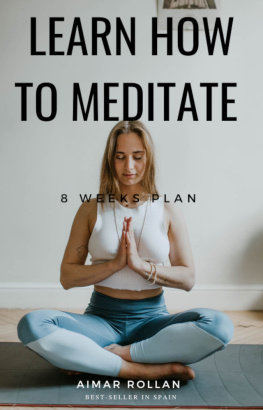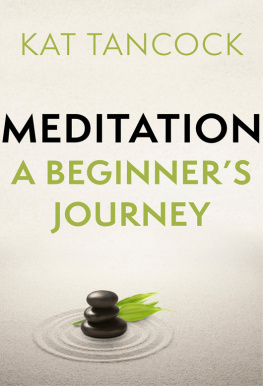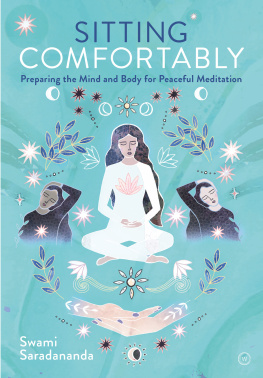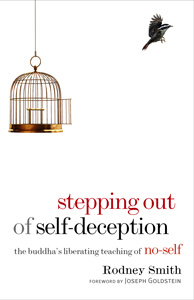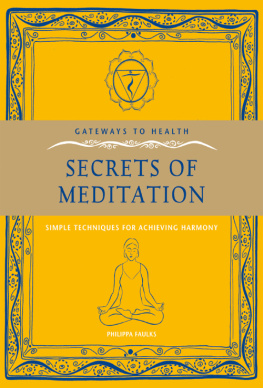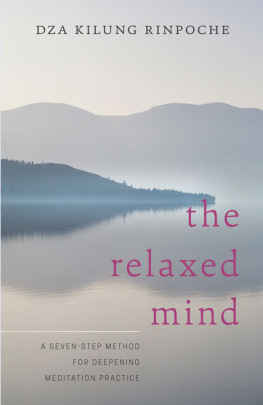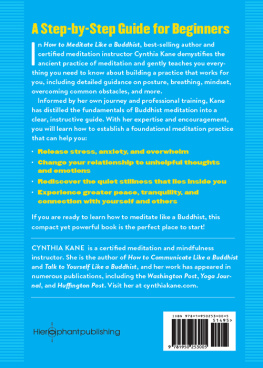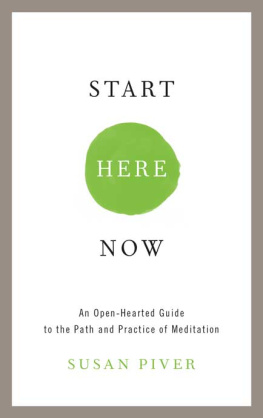Reproduction of this work without the
authors consent is strictly encouraged.
Connect:
Email:
Website: www.TommyAngelo.com
Twitter: https://twitter.com/TheTommyAngelo
Facebook: https://www.facebook.com/tommyangelooperations/
Previous books:
Elements of Poker
A Rubber Band Story and Other Poker Tales
Painless Poker
Waiting for Straighters
Copyright 2018 Tommy Angelo
Published by Tommy Angelo
Why Meditate?
I was 45 years old and ripe for a whole life makeover when I started meditating. One week later, I knew that I wanted and needed to meditate every day of my life. For the first time, I had real hope of getting my act together. If I could stick with it. And that sent me into a panic, because of my history of not sticking with it. So, out of necessity, and to keep the panic down, I strategized from the outset, to protect my practice from whatever might threaten it.
Meanwhile, over in the revenue world, I played poker for a living for many years, and then I became a poker coach who specialized in helping poker players play their best more often. All of my clients received a crash course from me on meditation, and some of them went on to become dedicated practitioners. My heart soared when they told me about watching themselves break free of harmful patterns that seemed utterly unchangeable just weeks before.
Along with their success stories, I shared their disappointment, and sometimes despair, when they lapsed. The frustration of having tasted the fruit of meditation, and then going hungry. Sometimes they asked me to help them restart, and wed talk about what happened that made them stop, so that it might not make them stop next time. Ive helped some non-poker-players too, with their practice. These experiences taught me that some meditation problems are common to all.
Its nearly impossible to start a meditation practice and keep it going. Its like blasting a satellite into orbit. First you have to win an epic battle against inertia. Then you need to make adjustments until you achieve a stable orbit. But if you can do all that, inertia becomes your friend, and you can coast.
This book is here to help you achieve orbit and sustain it. The word sustain brings three of its meanings to the context of meditation. It means to keep a process going. It means to supply nourishment . And the third meaning of sustain that applies to meditation is this: to undergo, to withstand. You keep your practice going by feeding it and withstanding it. This book will show you how.
Why meditate?
My favorite answer to that question is: to reduce unhappiness.
Sure, there are plenty of other answers. People meditate to boost productivity and increase focus. Or to improve their disposition to make themselves more patient, less irritable, more yielding, less selfish. Other reasons to meditate are to attain spiritual enlightenment and to suppress stress. And then theres plain old curiosity to see what will happen because nothing else has worked.
Why do we desire so many changes in ourselves? Its because everyone wants less unhappiness in their lives, and each of the changes I just listed reduces unhappiness, for the meditator, and for the meditators circle. What drives the changes? Its the simplest thing. Mindful breathing. Every mindful breath has the desired effect of reducing unhappiness.
If you think so too, and if you wish you did more mindful breathing, keep reading.
Heres a glance at the chapters:
First I propose that making a life-long commitment to never lapsing even for one day is a splendid idea.
Then we look at the foundations of a practice: posture, breathing, stillness, mindfulness, stretchy bendy stuff, resources, and community.
Then comes a whole bunch of strategies for staying on the path when you face obstacles such as lack of time, physical discomfort, interruptions, and traveling.
Next is the practice itself, in detail. First, how to begin your day. Then, how to use your intelligence, creativity, and zeal to speckle your days with the benefits of mindfulness.
The book ends with a one-page send-off called: You Have to Want It.
Things That
Non-Meditators
Do Every Day Sleep Wake up Eat Drink Pee Wear clothes Do stuff Read stuff Watch stuff Talk about stuff | Things That
Daily Meditators
Do Every Day Sleep Wake up Eat Drink Pee Wear clothes Do stuff Read stuff Watch stuff Talk about stuff Sit still |
The Dailyness Imperative
Its hard to start a campfire when all you have to work with is matches, moss, and twigs. But once you have a viable flame going, all is well. Just add kindling and logs, and youve got yourself a fire.
After the flames die down, the coal bed stays red-hot for hours. To start a new fire, you need only add kindling and logs to the coals. But if the coals go cold, all the way to gray, then you must start from scratch, huddled over a fragile tepee of twigs.
If you have ever exercised with regularity and then stopped, and then scolded yourself for months for not being able to reignite your fire, then you know what Im talking about.
Dailyness is about momentum. You have to work to build up momentum, and then once you have it, you can maintain momentum without a huge effort. Im talking about doing sitting meditation every day, no matter what, so that your coals never go cold.
Not only does dailyness eradicate lapsing, it also clears up any possible confusion. You never have to remember if today is the day you are going to meditate.
Daily sitting will relieve whatever worries you may have about the quality of your sitting. When you know youre going to meditate every day for thousands of days in a row, suddenly theres no pressure. With a lifetime of tomorrows, it doesnt matter how you perform today. You might be steady one day and fidgety the next, or maybe you feel like a slug and you are just going through the motions, grumbling the entire time.
I wrote all of that to say this: GO THROUGH THE MOTIONS!
It is necessary to sit on days when you feel logy and uninspired. Especially then. It doesnt matter if you were out partying like crazy last night. It doesnt matter if you have a cold. It doesnt matter if you traveled halfway around the world. To ensure that you will always have a practice until you can practice no more, you only need one thing: dailyness.
Setting Expectations
If quick gratification is what youre after,
dont take up violin, or meditation.
Its a wonderful ambition, to want to play music with grace and ease. And if I were your music teacher, I would want to help you get what you want. But first, you would have to convince me that you intend to practice every day. Thats because I know from experience that when adults take up a musical instrument, they are, for the most part, deluded.
How often do you intend to practice? I ask.
Three or four times per week, comes the reply.
At that point I feel duty bound to say, Your expectations are not realistic. You will not improve fast enough to satisfy your need for progress, and before long youll skip a few days of practice, and then a few more days, and then youll quit altogether.
Its the same with meditation.
But lets say you did take guitar lessons and you practiced every day for five years without skipping one day. What would your playing sound like then? Would you have new friends that you jam with? Would it be a hobby you do by yourself? Will you be any good? Will you care?


